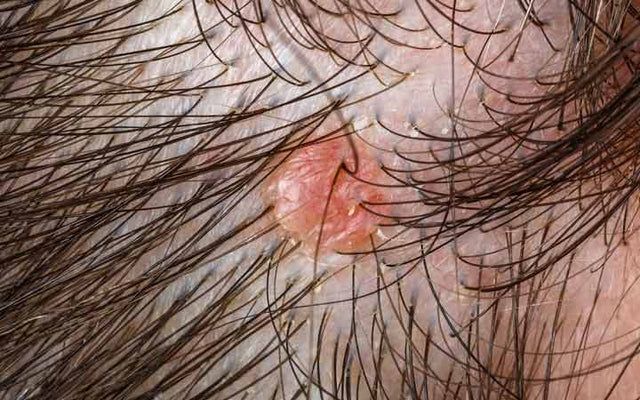
Best Scalp Tumor Treatment in Hyderabad
Scalp tumors can be benign (non-cancerous) or malignant (cancerous) growths that appear on the skin or tissues of the scalp. Early detection and the right treatment plan can make a significant difference in managing scalp tumors effectively.
Dr. Kranthi Kumar Gangiti, a leading surgical oncologist in Hyderabad, offers accurate diagnosis and advanced surgical solutions for scalp tumors. With expertise in handling complex head and neck tumors, including skull base tumors and salivary gland cancers, he ensures patient-centric care tailored to each case.
What is Scalp Tumor?
A scalp tumor is an abnormal growth or lump that forms on the scalp, either within the skin layers or deeper beneath the surface. These tumors may be benign (non-cancerous) or malignant (cancerous).
While some appear as small, harmless cysts, others may grow aggressively and require immediate medical attention. Early detection and proper evaluation are essential to determine whether the tumor on the scalp needs to be removed or monitored.
Types of Scalp Tumors
There are multiple types of scalp tumors, both benign and malignant. Common types include:
Benign Tumors:
- Epidermoid cysts – slow-growing, keratin-filled sacs
- Pilar (trichilemmal) cysts – arise from hair follicles
- Lipomas – soft, fatty tissue lumps under the skin
- Sebaceous adenomas – glandular growths that are usually non-cancerous
Malignant Tumors (Skin Cancers):
- Basal Cell Carcinoma (BCC) – slow-growing, less aggressive
- Squamous Cell Carcinoma (SCC) – more aggressive and may spread
- Melanoma – dangerous, fast-spreading skin cancer
- Cutaneous lymphoma – a rare type affecting the scalp
A cancerous cyst on the scalp may resemble a benign cyst but typically shows rapid growth, ulceration, or bleeding.
Symptoms of Scalp Tumor
Scalp tumors may start as small, painless lumps and can gradually grow over time. Common signs include:
- A noticeable lump or bump on the scalp
- Itching, redness, or irritation
- Pain or tenderness over the swelling
- Bleeding or ulceration in some cases
- Hair loss around the affected area
- A firm or fixed mass that does not move easily
If the tumor is cancerous, symptoms may worsen quickly or be accompanied by enlarged lymph nodes.
Causes of Scalp Tumors
Scalp tumors can develop due to various reasons. Some common causes include:
- Prolonged sun exposure leading to skin cancer
- Genetic mutations affecting skin or follicle cells
- Infections or chronic inflammation
- Cystic lesions that grow abnormally
- Prior radiation exposure or trauma
In rare cases, a cancerous cyst on the scalp may appear similar to a benign lesion, making proper diagnosis critical.
Diagnosis of Scalp Tumors
Diagnosing a scalp tumor involves both visual assessment and clinical evaluation. Tests may include:
- Physical examination of the scalp and surrounding areas
- Dermatoscopy for magnified inspection of the lesion
- Imaging tests such as ultrasound or MRI if the tumor is deep
- Biopsy to confirm the type of tumor and its malignancy
Accurate diagnosis is essential to decide whether scalp tumor removal or further cancer care is necessary.
Treatment Options for Scalp Tumor
Treatment depends on the tumor type (benign or malignant), size, location, and whether it has spread. Common treatment options include:
- Surgical excision – the most effective method to remove benign and malignant scalp tumors
- Wide local excision – for cancerous tumors, to ensure complete removal with clear margins
- Reconstructive surgery – if a large area is removed, especially near the hairline or forehead
- Radiation therapy – recommended for certain cancer types or residual tumor cells
- Targeted medications or chemotherapy – for advanced or aggressive malignancies
Early intervention prevents complications and improves cosmetic and medical outcomes.
Why Early Treatment is Important
Timely treatment of scalp tumors reduces the risk of:
- Cancer spread to lymph nodes or deeper tissues
- Infection, pain, or chronic scalp wounds
- Hair follicle damage or permanent hair loss
- Need for extensive surgery or radiation later
Some tumors on the scalp may appear harmless but can become cancerous if left untreated. The same approach is applied to other related cancers such as skin cancer and salivary gland tumors, making early screening vital.
Why Choose Dr. Kranthi Kumar Gangiti for Skin Cancer Treatment in Hyderabad?
- Specialist in Head & Neck Surgical Oncology with expertise in scalp tumor removal
- Experienced in handling both benign and cancerous scalp growths
- Uses advanced diagnostic and surgical tools for precision treatment
- Personalized care plans for faster healing and minimal scarring
Knowledgeable in managing related conditions like salivary gland cancer and skull base tumors
Book a Consultation Today
If you’re experiencing a lump or lesion on your scalp, seek immediate medical attention. With modern diagnostic tools and specialized surgical care, scalp tumor treatment in Hyderabad is now more precise, safe, and effective.
Dr. Kranthi Kumar Gangiti and his team offer comprehensive care, from diagnosis to surgical management and recovery planning. Whether it’s a benign cyst or a suspicious growth, you’ll receive expert care customized to your condition.
Frequently Asked Questions
A painless lump, persistent itching, skin changes, or hair loss over a spot could be early signs. It’s best to consult a head & neck specialist for proper evaluation.
While benign tumors are less likely to return, malignant ones may recur without complete removal. Follow-up care and regular monitoring help prevent recurrence.
No, many scalp tumors are benign, like lipomas or cysts. However, some may be cancerous, so a biopsy is crucial to determine the exact nature.
Recovery usually takes 1–2 weeks for minor surgeries and up to 4 weeks for complex cases. Healing time also depends on tumor type and size.
Dr. Kranthi Kumar Gangiti is a renowned head and neck surgical oncologist offering precise diagnosis, surgical expertise, and personalized care for all types of scalp tumors.
